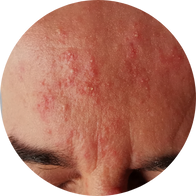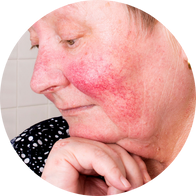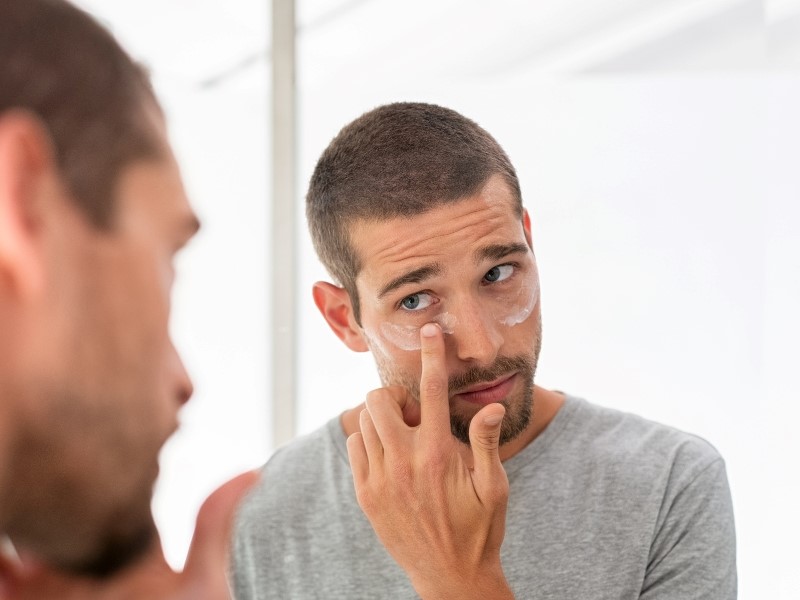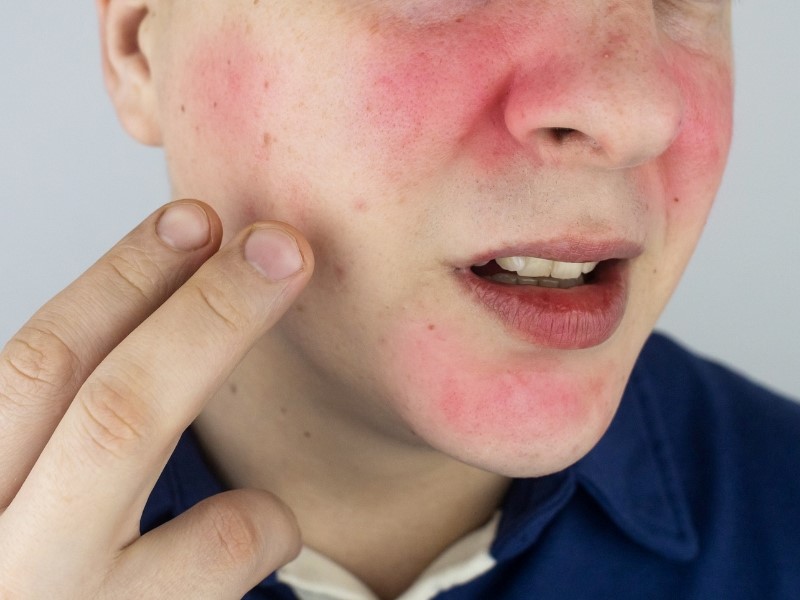Rosacea is a skin condition that affects millions of people around the world. It is a chronic, inflammatory skin disorder that causes redness, flushing, and visible blood vessels on the face. In this guide, we’ll explore the symptoms, causes, and treatment options for rosacea, so you can better understand and manage this condition.
What is Rosacea?
Rosacea is a chronic skin condition that affects the face, causing redness, bumps, and visible blood vessels. It most commonly appears in adults over the age of 30 and can be mistaken for other skin conditions, such as acne. Rosacea is a relapsing and remitting condition, meaning that symptoms can flare up and then subside. While there is no cure for rosacea, there are a number of treatments available that can help manage symptoms and improve the overall appearance of the skin.
We suggest you to read more about skin diseases by click on the link.
Symptoms of Rosacea
Rosacea primarily affects the face; however, it is important to note that not all individuals with rosacea experience the same symptoms, and symptoms can vary in severity. Here are some common symptoms of rosacea:
- Redness: Persistent facial redness is often the first sign of rosacea. This redness can appear as a general flush or as distinct areas of redness, such as on the cheeks, nose, or forehead.
- Visible blood vessels: Small blood vessels may be visible on the skin, particularly on the cheeks or nose. This is known as telangiectasia.
- Bumps or pimples: Bumps or pimples on the skin are another common symptom of rosacea. These may be small and red, and they can be mistaken for acne.
- Eye symptoms: Rosacea can affect the eyes, causing symptoms such as dryness, burning, or itching. In severe cases, rosacea can cause vision problems.
- Thickened skin: In some cases, rosacea can cause the skin to become thickened and bumpy, particularly on the nose. This is known as rhinophyma.
- Flare-ups: Rosacea is a relapsing and remitting condition, meaning that symptoms can flare up and then subside. Numerous factors, including stress, and certain foods, can trigger flare-ups.
It is crucial to remember that not everyone who has rosacea exhibits all of these symptoms. While some people only have minor redness, others may have more serious symptoms that have an impact on their quality of life. Additionally, the signs and symptoms of rosacea may alter over time. For instance, as the condition progresses, a person who had previously only experienced facial redness may start to get bumps or pimples.

It is crucial to seek the expertise of a dermatologist for an accurate diagnosis and treatment if you are exhibiting signs of rosacea. While there is no known cure for rosacea, there are a number of treatments that can help manage the condition’s symptoms and enhance the skin’s overall appearance. Most individuals with rosacea can effectively manage their symptoms and keep their skin clear and healthy with the right care.
Causes of Rosacea
Although the exact cause of rosacea is not fully understood, there are a number of factors that are thought to play a role in its development. Explained below are a few possible causes of rosacea:
- Genetics: Rosacea runs in families, which suggests that genetics may play a role in its development.
- Abnormal immune response: Rosacea is caused by an abnormal immune response in which the body’s immune system attacks healthy skin cells, according to some researchers.
- Demodex mites: These are microscopic organisms found on the skin. While most people have these mites on their skin, some studies have suggested that people with rosacea may have a higher number of these mites on their skin.
- Environmental factors: Certain environmental factors can cause or worsen rosacea symptoms. These can include but are not limited to exposure to the sun, wind, heat, or cold weather.
- Blood vessel abnormalities: Some researchers believe that rosacea is caused by blood vessel abnormalities in the skin. These irregularities may cause blood vessels to dilate excessively, resulting in redness and inflammation.
- Neurovascular dysregulation: The term “neurovascular dysregulation” refers to a malfunction in the way the nervous system controls blood flow in the skin. According to some researchers, this may play a role in the development of rosacea.
- Other medical conditions: Some medical conditions, such as autoimmune disorders and gastrointestinal disorders, have been linked to an increased risk of rosacea development.
It is worth mentioning that the causes of rosacea are complex and not fully understood. The development of rosacea is likely influenced by a number of factors, including genetic, environmental, and immune factors.

Receiving a proper diagnosis and treatment for rosacea is crucial if you are experiencing symptoms. Although the underlying causes of rosacea are unknown, there are numerous treatment options available to help manage the symptoms and improve the overall appearance of the skin. Most people with rosacea can maintain healthy, clear skin by effectively managing the condition. As a result, it is critical to consult with a dermatologist as soon as possible to receive the necessary rosacea treatment and management plan.
Treatment for Rosacea
While there is currently no certain cure for rosacea, there are several treatment options that can effectively manage its symptoms. Below are more details on the different types of rosacea treatments:
- Topical Treatments: The most common method for treating mild to moderate rosacea symptoms is a topical treatment. These remedies are typically applied directly to the skin’s affected area and come in the form of creams or gels. The components in these topical treatments can aid in reducing skin inflammation, redness, and breakouts that resemble acne. Antibiotics, anti-inflammatories, and sulfur are some of the most frequently used components in topical treatments.
- Oral Medications: When topical remedies are ineffective at controlling symptoms, a dermatologist might suggest oral medications. These drugs may include antibiotics or isotretinoin, which can aid with rosacea-related inflammation, redness, and breakouts that resemble acne.
- Laser Therapy: This is a treatment that uses light energy to reduce redness, visible blood vessels, and other symptoms associated with rosacea. To help manage symptoms more successfully, this treatment is frequently used in conjunction with topical or oral medications.
- Lifestyle Changes: Implementing certain lifestyle changes can also help manage the symptoms of rosacea. For instance, staying away from triggers like spicy foods, alcohol, and sun exposure can help alleviate symptoms. Additionally, using gentle skincare products, such as fragrance-free moisturizers, and avoiding harsh scrubs or exfoliants can also help manage symptoms. Also choose a sunscreen that is formulated for sensitive skin and has an SPF of at least 30

There are several self-care techniques that can help manage rosacea symptoms in addition to medical treatments. Such techniques involve:
- Avoiding triggers: There are numerous factors that can make rosacea symptoms severe. Extreme temperatures, alcohol, caffeine, and spicy foods are a few of these. Maintaining a journal to track triggers can help with managing the condition.
- Using gentle skincare products: Using abrasive scrubs or exfoliants can aggravate rosacea symptoms by irritating the skin. It’s crucial to select skincare products that are mild and designed especially for sensitive skin. Use only non-alcoholic or fragrance-free products.
- Applying cool compresses: Rosacea-related redness and inflammation can be significantly reduced by applying cool compresses to the affected areas. You can create cool compresses by soaking a washcloth in cool water and using it on your face for a few minutes.
- Managing stress: Rosacea is frequently brought on by stress. So, controlling stress through exercise, meditation, or other forms of relaxation can help with symptoms. Yoga classes and deep breathing exercises are both effective ways to lower stress.
Individuals with rosacea can effectively manage their condition and keep their skin clear and healthy by using a combination of medical treatments and self-care techniques. In conclusion, to receive an accurate diagnosis, the best course of treatment, and management for rosacea, it is important to consult with a dermatologist.
However, if you find that your rosacea symptoms persist despite trying various self-care techniques and over-the-counter treatments, it’s essential to seek professional help. A dermatologist can provide personalized guidance and prescribe specific rosacea treatments tailored to your unique condition. At RemoteDerm, our experienced dermatologists specialize in diagnosing and addressing the root causes of rosacea. Take the first step towards managing your rosacea effectively by getting an online consultation with our dedicated specialists in Canada.
Prevention of Rosacea
While there is no guaranteed way to prevent rosacea, there are steps that people can take to reduce their risk of developing the condition or to reduce the severity of its symptoms. Here are some rosacea prevention tips:
- Avoid triggers: spicy foods, hot drinks, and alcohol, for example, can aggravate rosacea symptoms. Try to recognize and avoid your own personal triggers.
- Use gentle skincare products: harsh cleansers, scrubs, and exfoliants can cause skin irritation and exacerbate rosacea symptoms. Instead, opt for gentle, non-irritating products that are fragrance- and alcohol-free.
- Manage stress: Another common cause of rosacea symptoms is stress, as mentioned earlier. Exercise, meditation, deep breathing, and other relaxation techniques can help you reduce stress.
- Take care of your eyes: rosacea can cause dryness, burning, and redness in the eyes. Wear sunglasses and, if necessary, lubricating eye drops to protect your eyes.
- Keep cool: Overheating can aggravate rosacea symptoms, so stay cool in hot weather or while exercising. Try to avoid hot showers or baths and instead use cold showers to reduce redness and inflammation.
- See a dermatologist: If you have rosacea symptoms, you should see a dermatologist for a proper diagnosis and treatment. Most people with rosacea are able to effectively manage their symptoms and maintain healthy, clear skin with proper management.

These actions can help individuals lower their risk of getting rosacea or lessen the severity of its symptoms. The general health and appearance of the skin can be enhanced by following these recommendations.
Living with Rosacea
As mentioned, rosacea has no known cure, but there are steps people with the condition can take to manage their symptoms and enhance their quality of life. Following are some pointers for managing rosacea:
- Follow a skincare routine: Rosacea symptoms can be controlled with a gentle skincare routine that stays away from abrasive items and exfoliants.
- Identify and avoid triggers: Alcohol, hot beverages, and spicy foods are just a few factors that can worsen rosacea symptoms. Look for and steer clear of your own triggers.
- Sun protection: Wear sunscreen and protective clothing when spending time outdoors.
- Control your stress: Rosacea symptoms may become worse under stress. Try to incorporate relaxation techniques, such as deep breathing or meditation, into your daily routine.
- Seek support: It can be emotionally taxing to live with rosacea. If necessary, ask friends, family, or a mental health professional for assistance.
- Follow medical treatment: Follow the dermatologist’s advice for medical treatment, if prescribed. Oral antibiotics, topical creams, and light therapy are some examples of such treatments.

These actions can help individuals with rosacea control their symptoms and enhance their quality of life. Working together with a dermatologist to develop a personalized treatment plan is essential in Rosacea symptoms management.
Final Thoughts
Rosacea can be a challenging condition to manage, but with proper diagnosis and treatment, most people can manage the symptoms and maintain healthy skin. Treatment options range from topical creams to laser therapy, and each person’s treatment plan may vary depending on their individual symptoms and medical history.
Additionally, adopting healthy lifestyle habits, such as wearing sunscreen and avoiding triggers, can help reduce the frequency and severity of flare-ups. Overall, with proper management, people with rosacea can lead healthy and fulfilling lives.
It is also extremely important to consult a dermatologist if you are experiencing symptoms of rosacea to ensure that you receive the correct diagnosis and treatment plan. If you have a busy lifestyle or live in a remote area in Canada, you can benefit from the teledermatology services. Remotederm is a platform on which you can find the best online dermatology consultation, where you can discuss your skin concerns in the comfort of your home. Get a dermatology consultation from anywhere in Canada with Remotederm – quick, convenient, and comfortable!
FAQs:
1. What are the most common symptoms of rosacea?
The most common symptoms of rosacea include redness, flushing, bumps and pimples, visible blood vessels, and eye irritation.
2. What causes rosacea and can it be prevented?
The exact cause of rosacea is unknown, but it is believed to be a combination of genetic and environmental factors. Rosacea cannot be prevented, but triggers can be avoided to manage symptoms.
3. What is the best treatment for rosacea?
The best treatment for rosacea depends on the individual and their specific symptoms. Some common treatments include topical and oral medications, laser therapy, and lifestyle changes.
4. How long does it take for rosacea to clear up with treatment?
The length of time it takes for rosacea to clear up with treatment varies from person to person. It can take several weeks to see improvement, and ongoing treatment may be necessary to manage symptoms.
5. Are there any lifestyle changes or home remedies that can help manage rosacea?
Lifestyle changes such as avoiding triggers, using gentle skincare products, and protecting the skin from the sun can help manage rosacea symptoms. Some home remedies like green tea, chamomile, and aloe vera may also provide relief. However, it’s important to consult with a healthcare provider before trying any new treatment.

8 comments
I have rosacea and it’s really frustrating. I’ve tried different creams and medications but nothing seems to work. Is there any hope for a cure?
We’re sorry to hear that you have rosacea and that you haven’t found a treatment that works for you. Rosacea is a chronic condition that can be managed but not cured. However, there are different options available depending on your type and severity of rosacea. We recommend that you consult with one of our online dermatologists who can assess your skin and prescribe a personalized treatment plan for you. You can get online consultation here: https://remotederm.ca/
Thank you for this informative article. I didn’t know that rosacea could affect the eyes too. How can I prevent eye problems from rosacea?
Thank you for your kind words. We’re glad that you found our article informative. Rosacea can affect the eyes in some cases, causing dryness, irritation, redness or swelling of the eyelids. This is called ocular rosacea and it can be treated with eye drops, oral antibiotics or other medications prescribed by your doctor. To prevent eye problems from rosacea, you should avoid triggers that cause facial flushing, such as hot drinks, spicy foods or alcohol, wear sunglasses to protect your eyes from sun exposure and wind, and practice good eye hygiene by washing your eyelids gently with warm water and a mild cleanser every day.
I think I might have rosacea because my face gets red and hot sometimes, especially when I drink alcohol or eat spicy food. What should I do next?
This article was meant to provide general information about rosacea and its symptoms. It is not intended to diagnose or treat any medical condition. If you think you might have rosacea or any other skin problem, you should consult with a qualified dermatologist who can examine your skin and confirm your diagnosis. You can use our online platform to connect with a Canadian board certified dermatologist in minutes without waiting or needing a referral. Just fill out this form: https://remotederm.ca/pages/auth?type=login
I’ve been diagnosed with rosacea and my doctor prescribed me some antibiotics and a topical gel. How long do I have to use them? Will they cause any side effects?
Rosacea is a condition that requires ongoing treatment to keep it under control. The duration of treatment depends on how well your skin responds to it and how often you experience flare-ups. Some people may need to use medications for months or years while others may only need them occasionally when their symptoms worsen. The medications prescribed for rosacea may cause some side effects such as dryness, irritation, sun sensitivity or stomach upset but they are usually mild and temporary. You should follow your doctor’s instructions on how to use them correctly and report any adverse reactions if they occur.